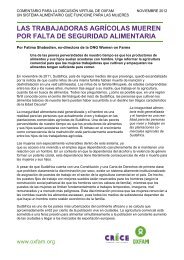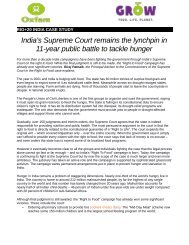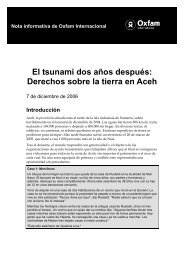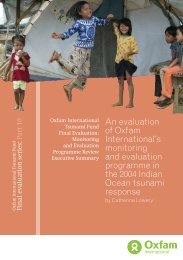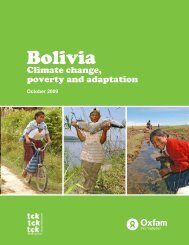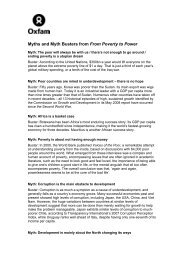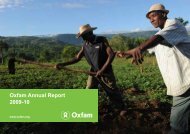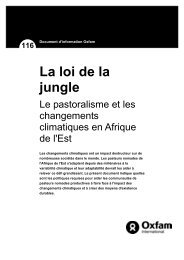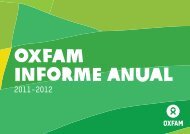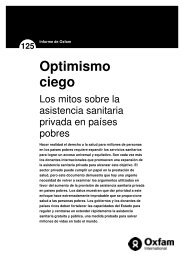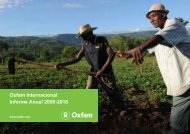Oxfam Strategic Plan, 2013-2019 - Oxfam International
Oxfam Strategic Plan, 2013-2019 - Oxfam International
Oxfam Strategic Plan, 2013-2019 - Oxfam International
You also want an ePaper? Increase the reach of your titles
YUMPU automatically turns print PDFs into web optimized ePapers that Google loves.
THE POWER OF PEOPLE AGAINST POVERTY 11<br />
OXFAM STRATEGIC PLAN, <strong>2013</strong> – <strong>2019</strong><br />
Development is about power and its progressive<br />
redistribution from the haves to the have-nots. This<br />
touches on the deepest structures that underlie society,<br />
politics and the economy. The starting point for <strong>Oxfam</strong> is<br />
therefore ‘power analysis’ – understanding the current<br />
distribution of power between different actors in the<br />
development drama, and how that affects the struggle for<br />
change: who are the drivers of the change? Who are the<br />
blockers likely to oppose it? What are the main institutions<br />
involved, whether formal (e.g. ministries) or informal (e.g.<br />
customs and beliefs)? What coalitions and alliances can<br />
be built either to strengthen the drivers or overcome the<br />
blockers?<br />
The answers will vary depending on issue and context<br />
(open versus closed systems; local versus national), but<br />
power analysis is as essential when seeking changes to<br />
attitudes and beliefs on issues such as violence against<br />
women, as to changing public spending priorities or the<br />
legal rights of poor people. Effective alliances may be<br />
‘horizontal’, bringing together similar organizations such<br />
as peasant producers or women’s savings groups, but<br />
often <strong>Oxfam</strong> can play a particular role in convening (and<br />
building trust within) ‘vertical’ alliances of non-usual<br />
suspects, bringing together civil society organizations<br />
with private sector companies, urban groups, middle class<br />
philanthropists, sympathetic state bodies or faith-based<br />
organizations.<br />
One effective way to build such alliances is by generating<br />
a solid evidence base to make the case for change. <strong>Oxfam</strong><br />
is both supporting a range of ‘access to information’<br />
initiatives that equip civil society with the data they need<br />
to lobby on public spending or other issues, and expanding<br />
its own ability to produce credible research. One particular<br />
strength is the ability to combine programming work (for<br />
example piloting new approaches) with research and<br />
advocacy.<br />
Role<br />
Based on this Theory of Change, <strong>Oxfam</strong>’s role is to enable<br />
transformational change, as convenor and catalyst;<br />
opening political space, building capacity and sharing<br />
technical expertise, raising funds and public support,<br />
leveraging our own resources to multiply funds, providing<br />
strategic funding to partners and carrying out humanitarian<br />
work that integrates life-saving response with building<br />
resilience. Our approach is to be both practical and<br />
visionary.<br />
Enabling requires listening, showing solidarity in words<br />
and actions, supporting and collaborating in partnerships<br />
without imposing top-down solutions; and acting as a<br />
respectful ally. It can also mean expressing a view if that<br />
increases impact and expands political space and voice for<br />
partners and allies.<br />
Transformational change means projecting our vision of<br />
fairness, equity and rights, a vision that resonates in all<br />
countries. It means the communities and partners we work<br />
with acquiring or taking power, equitably and irreversibly,<br />
to realize their rights with dignity. It means people and<br />
communities, particularly women and girls, gaining<br />
confidence, capabilities and hope, in the place of apathy<br />
and exclusion.<br />
Transformational change also means structural change.<br />
Changing the policies and practices of governments,<br />
institutions and businesses, to improve equality and<br />
inclusion, and to help people rise out of poverty.<br />
Change is sometimes a smooth, steady process, but often<br />
emerges from ‘critical junctures’ – windows of opportunity<br />
provided by elections, changes in leadership, natural<br />
disasters or conflicts. <strong>Oxfam</strong>’s theory of change stresses<br />
the need to improve its ability to identify and respond<br />
to such moments. Nor is change always peaceful – it<br />
is often accompanied by social conflict. Improving our<br />
understanding of the turbulent and complex dynamics of<br />
change in the lives of poor people is at the heart of this<br />
strategic plan.



